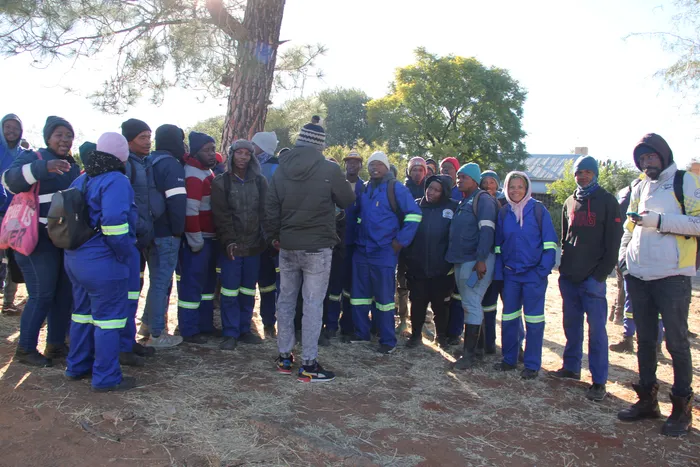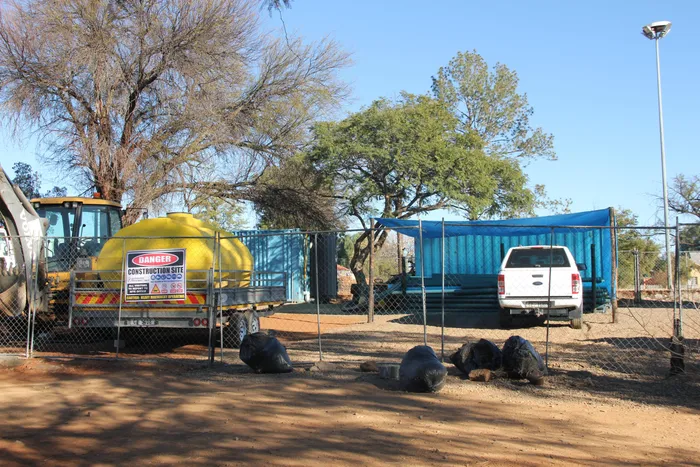Kimberley water meter project stalls over pay row

Water meter installers have cried foul over alleged changes to payment rates.
Image: Sandi Kwon Hoo / DFA
LOCAL labourers and plumbers working on a municipal project to install thousands of new water meters across Kimberley have downed tools in protest over alleged pay cuts and unsafe working conditions.
They also claim they are being paid less than counterparts apparently brought in from Limpopo.
The workers, hired by a private contractor appointed by the Sol Plaatje Municipality, say they were suddenly told to accept a new payment structure that drastically reduces their daily earnings — or risk being replaced.
On July 8, they staged a demonstration outside the contractor’s De Beers site, using branches and refuse bags to block access.
They said about 20 plumbers and 40 general labourers were hired on the site.
The workers claim they were given an ultimatum this week to accept a new rate of R20 per water meter installed.
“We are being worked out of our jobs as transport costs R30 per day. We were threatened that if we didn't agree, we would be replaced by other labourers. We will not allow other workers to take our place,” they said.
They added that, to make ends meet, they would be required to work until midnight.
“It was previously agreed that we would be paid R180 per day. It takes time to dig through rocky soil, which means we are not meeting our targets. We have a lot of work to do before the contract expires.”
Workers also cited a lack of personal protective equipment (PPE), tools, and other resources.
“We work under dangerous conditions without safety boots, tools or equipment. Some of us have encountered snakes while digging trenches by hand and were bitten by dogs. If we get sick, we are not offered any medical assistance,” they claimed.
Following a meeting held at the Sol Plaatje Municipality on July 9, the labourers said they were instructed to return to work.
“We were told that we are weak because we never set tyres alight. We do not want to be arrested by the police,” they added.

Disgruntled labourers placed branches and refuse bags at the entrance of the contractor’s site in De Beers.
Image: Sandi Kwon Hoo/ DFA
Sol Plaatje Municipality spokesperson Thabo Mothibi said the main contractor was De Jager Lootgieters Belegings from Beaufort West.
“They were selected following a competitive bidding process to reduce water losses through leak repairs, which includes the replacement of faulty meters,” he explained.
He said that the contractors were experienced and had a track record of over 20 years in the industry.
“To date, no labourers or plumbers have been appointed from Limpopo or from outside the municipal boundary of Sol Plaatje Municipality,” he added.
Mothibi said the project aims to install at least 7,500 conventional water meters over 24 months.
“The supervisory staff have been recruited from all over the country, at the prerogative of the contractor. The engineers, Bigen Africa, have set a target that each labourer should install 15 meters per day.”
He added that the agreed-upon rate of R180 per day for labourers still applied.
“Any misunderstanding stemmed from new targets given to contractors. Legal contracts will be signed by July 11.”
Mothibi said PPE was issued on Wednesday to all recently appointed workers, while those who started earlier already had PPE. Transport is provided from the site office to installation points, with four bakkies transporting workers.
“The contractor will assist when incidents of injury on duty occur, and within the framework of labour legislation,” he added.
Mothibi said claims that workers from Limpopo were hired were false.
“This is a deliberate ploy to incite local communities. We have also noted the video on social media claiming that the water meters being installed will lead to pay-as-you-go water purchases. This is a deliberate distortion and also aimed at inciting the public.”
He emphasised that the new conventional water meters were being installed to ensure accurate readings and to eliminate interim readings.
“We are also addressing water losses as flagged by the Auditor-General,” said Mothibi.